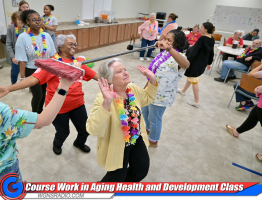In recognition of National Drug Court Month, also known as Recovery Court Month, the Tennessee Department of Mental Health and Substance Abuse Services seeks to honor and recognize those who administer these courts as well as the individuals whose lives are transformed.
Since 2003 drug courts, now known more commonly as recovery courts in Tennessee, have offered intensive supervision, substance abuse treatment services, and other incentives to address the unique needs of drug-addicted, non-violent offenders. A number of these courts also serve veterans and people with mental health issues.
"Recovery courts offer Tennesseans a second chance," said E. Douglas Varney, Commissioner for the Tennessee Department of Mental Health and Substance Abuse Services. "Recovery courts are one of the most effective ways to divert people from incarceration and to reduce recidivism. By addressing their substance use and mental health challenges, this program puts them on a path to a more successful, rewarding, and drug-free future."
"We have watched the number of justice-involved veterans incarcerated in state prisons and county jails decrease from 2,483 in 2012 to 1,307 in 2015," Tennessee Department of Veterans Services Commissioner Many-Bears Grinder said. "Connecting justice-involved veterans with the appropriate treatment, jobs, education, services and resources through these courts helps them get back on track instead of behind bars."
Participation in the courts has grown substantially during Governor Bill Haslam's administration, from 1,315 to 5,689 new admissions over the last four years. As involvement has increased, so has access to the court programs which are now in 75 counties and 28 judicial districts. And the Governor's current budget includes more money to expand these courts.
In an evaluation of participants in a Tennessee Recovery Court from 2013 to 2015:
- 81% became employed or saw improvement in their job status
- Only 3.5% had an employment status that remained unchanged
- 28% who were homeless or living in a group home secured their own place
- 63% maintained an independent living situation upon completing the program
- 7% had a living situation that didn't change from admission to discharge
While the majority of those participating in a Tennessee Recovery Court came into the program with a high school diploma or GED, 14% improved their education status by obtaining a GED or securing an advanced degree.
"These outcomes speak to the powerful impact Recovery Courts are having on our families, friends, and neighbors in Tennessee," said Commissioner Varney. "It's effective for those who agree to participate and for Tennessee it's a low-cost, high-impact approach that gives people their lives back, to be productive citizens, and it's far more cost effective than incarceration. This represents an alternative that's working."
"Over the last few years, recovery courts in Tennessee have shown us how an alternative to the traditional court, sentencing, and incarceration can transform the life of a person who has struggled with an addiction," said Commissioner Varney. "Seeing these individuals realize their full potential is powerful. We all benefit from recovery courts."












